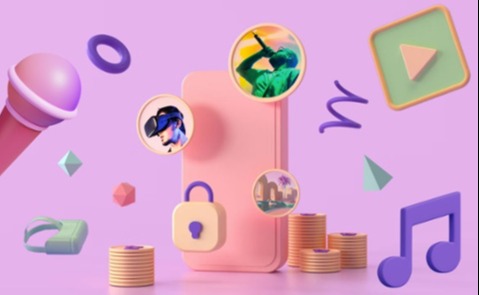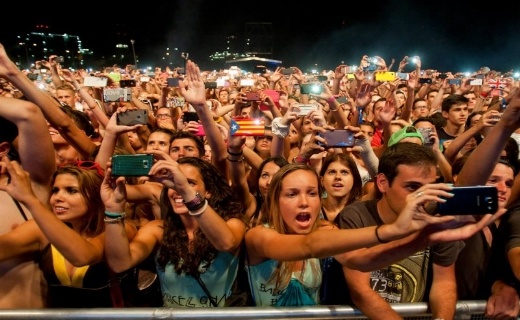
Music festivals are huge events in the cultural calendar and they have now extended their reach globally by attracting a much wider audience of non-festival goers, who will tune into social media because of the “halo effect” that influential celebrities bring to these events. It’s the clothes they’re wearing, how they’ve done their hair and who they are with, that people are also interested in. No doubt, fashionable celebrities coupled with exciting performance line-ups have turned festivals into a massive social media phenomenon.
Mobile apps amplify the shared music experience
For the tech-savvy audience, social media has been very instrumental in enabling music fans to experience music festivals vicariously through live Tweets, Snapchat, Facebook and Instagram posts – making shared music experiences with iconic people even better. Smartphones, inevitably, have become the most reliable companion of music fans.
Technology has an enormous role to play in amplifying the music festival experience before, during and after these events as organisers can find memorable ways for artists to engage with their devoted fans. For instance, artists can record on-the- go videos while backstage and push this exclusive content instantaneously on mobile for the expecting fans. Likewise, sponsoring brands can push on-the- go videos on mobile to offer a more personalised, unique and location-based offer to a specific target audience.
Brands leverage technology to engage consumers
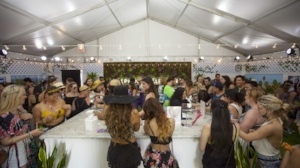 Big fashion and beauty brands, like Hunter, Barbour, H&M, Tag Heuer, Perverse Sunglasses and Sephora have leveraged music and festivals as an extension of their runways and stores to engage those hard-to- reach millennials, who love to see the perfect festival outfits their favourite celebrities are wearing. Music is an extension of the festival goer’s personality and music is their way of expressing it. Using technology, brands are able to leverage this in various ways, including using geo-targeted offers pushed via mobile, female festival goers could be targeted to promote an ad to try a hair mist and young males could be approached about an energy drink.
Big fashion and beauty brands, like Hunter, Barbour, H&M, Tag Heuer, Perverse Sunglasses and Sephora have leveraged music and festivals as an extension of their runways and stores to engage those hard-to- reach millennials, who love to see the perfect festival outfits their favourite celebrities are wearing. Music is an extension of the festival goer’s personality and music is their way of expressing it. Using technology, brands are able to leverage this in various ways, including using geo-targeted offers pushed via mobile, female festival goers could be targeted to promote an ad to try a hair mist and young males could be approached about an energy drink.
From pop-up shops, branded tents and interactive events hosted by relevant brands inside the festival grounds, as well as off-site, digital influencer-driven events that create content to engage both festival-goers and the audiences watching from home, to festival fashion collections, the competition is fierce and growing every year.
Technology enhances the festival experience
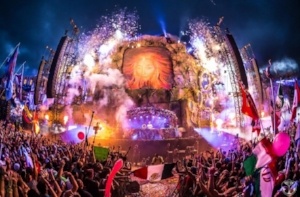 So how can organisers and associated brand sponsors enhance the music festival experience for the lucky few who do attend? There are several technology-related options to make the festival experience great so they don’t miss a beat. However, at the end of the day, two crucial things can stop them dead in their tracks and prevent them from interacting with their mobile and more importantly sharing their experiences battery life and 4G connectivity.
So how can organisers and associated brand sponsors enhance the music festival experience for the lucky few who do attend? There are several technology-related options to make the festival experience great so they don’t miss a beat. However, at the end of the day, two crucial things can stop them dead in their tracks and prevent them from interacting with their mobile and more importantly sharing their experiences battery life and 4G connectivity.
There is a multitude of tools to make the festival experience more enjoyable, more efficient and with minimal disruption, including wristband activation, friend finder, shuttle tracker as well as meal planners. Technology not only addresses logistical nightmares, but more importantly, it allows personal interaction to occur in what could have been a fragmented audience. Without being intrusive, music apps for instance, can gather personal information through mobile(location, gender, age and so on), so sponsoring brands are able to offer personal and relevant offers to these fans, enabling higher engagement.
Some great examples of savvy brands that have used music festival sponsorship to engage with millennials are summarised below.
1. Tomorrowworld music festival : technology creates an interactive and memorable festival experience
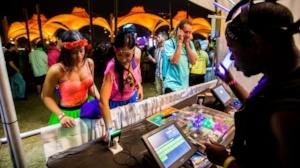 Tomorrowworld Music Festival is a prime example of how technology can amplify a musical experience. They have propelled a digital revolution which others are now following by doing away with concert tickets; instead, they usewearable tech wristbands. Not only do these wearable tickets contain attendees’ information, it prevents attendees from losing their tickets and facilitates a cashless environment.
Tomorrowworld Music Festival is a prime example of how technology can amplify a musical experience. They have propelled a digital revolution which others are now following by doing away with concert tickets; instead, they usewearable tech wristbands. Not only do these wearable tickets contain attendees’ information, it prevents attendees from losing their tickets and facilitates a cashless environment.
Even the purchasing of food/drinks and merchandise is all done via these very cool wearable tech wristbands, creating a seamless experience that makes music the focal point. This convenient invention in today's ever increasing world of tech is one to be marvelled at and replicated in numerous ways. Further, with music fans enjoying their music with a side of social, these wristbands contain emails linking to one another's Facebook accounts so that festival goers can add new friends and share experiences.
2. Hunter engages millennials through music sponsorship and turns them into brand ambassadors
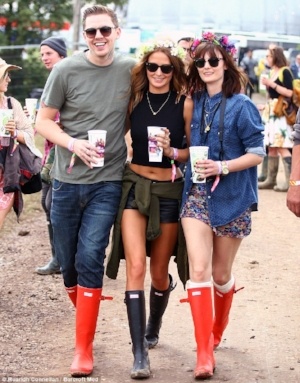 British heritage fashion brand Hunter is on a global mission to expand and integrate music into its marketing strategy in a bid to engage with festival-goers. Hunter is ramping up its ties for 2016 with music festivals and debuting new flagship stores in the highly sought-after fashion capitals of Tokyo, New York and Hong Kong.
British heritage fashion brand Hunter is on a global mission to expand and integrate music into its marketing strategy in a bid to engage with festival-goers. Hunter is ramping up its ties for 2016 with music festivals and debuting new flagship stores in the highly sought-after fashion capitals of Tokyo, New York and Hong Kong.
The company is popular for its Hunter Wellington (gum) boots and is on every festival goers must have items, so it made sense to leverage music in their marketing strategy to create an authentic connection with consumers.
Hunter’s creative director, Alasdhair Willis said: “Hunter has been on an incredible journey these past two years, gathering real momentum as we set about transitioning this 160 year-old business. During this massive transformative period, we have delivered four brand-defining Hunter Original shows at London Fashion Week.”
Hunter has decided that participating at music festivals in 2016 will allow the brand to engage with a new set of consumers. By making its wellies a favourite amongst festival-goers, Hunter extended its brand footprint away from the traditional fashion runways and into the vast real world of its consumers. Inevitably, the result was an authentic endorsement of this footwear by the millennials.
What makes Hunter’s authentic involvement in music festivals on point is how its widely popular wellies were especially manufactured for festival-goers. By offering revellers’ waterproof boots at muddy events, Hunter has addressed consumer demand like a match made in heaven.
3. Glasto sponsor EE provides 4G connectivity, power bars and mobile charging
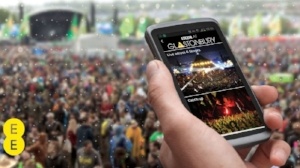 Glastonbury sponsor EE again made sure festival-goers stayed connected and were able to share their experiences with superfast data connectivity during their trip to Worthy Farm in June 2016.
Glastonbury sponsor EE again made sure festival-goers stayed connected and were able to share their experiences with superfast data connectivity during their trip to Worthy Farm in June 2016.
The mobile broadband provider installed the infrastructure required for 4G connectivity on-site. Six mobile masts, located around the festival site, ensuring campers and festival goers could get online and take advantage of super-fast broadband. They were able to upload pictures and videos, and update their Facebook, Instagram and Twitter feeds instantly, at any time of their choosing.
As well as offering super-fast mobile connectivity with the ability to carry three terabytes of data over its Glastonbury network - EE installed mobile charging points around the camp. These ensured guests could charge their tablets and smartphones and swap their power bars, for use across the entire weekend.
Music festivals provide an incredible opportunity for brands to engage a key target group of consumers, particularly the millennials. With the logistics involved in orchestrating a music festival, mobile technology has become an important tool used to bridge the gap between brands, organisers and music fans and to minimise the fragmented experience. Using mobile gathered-data, music fans can have a more rewarding pre, during and post event experience, while brands are able to reach them on a personal and relevant level. Music, as an engaging and sought out experience fits into a brand’s execution strategy. The ability to use music and trade experience for user data is a standout opportunity providing value to both users and brands.
If you found value or insight from this post, please consider sharing it on Twitter or Linkedin. Thanks for reading!
Follow Tuned Global and always be in the know.
Follow @TunedGlobal


